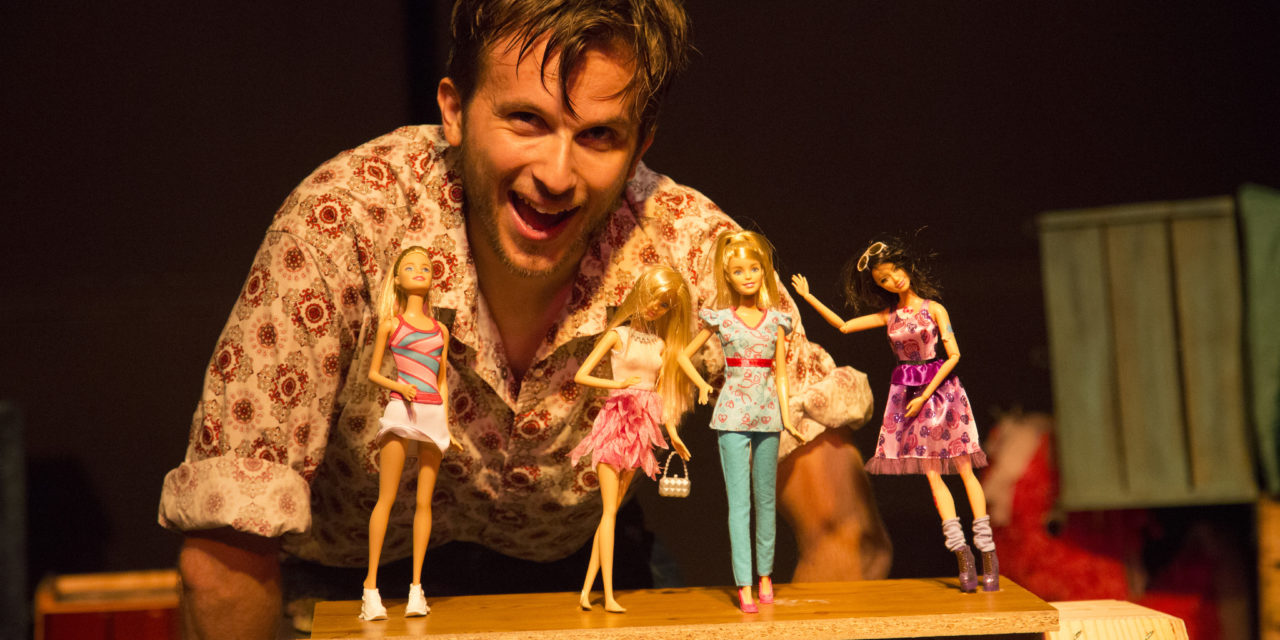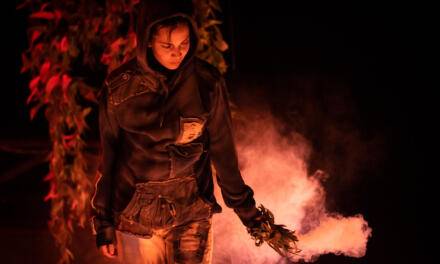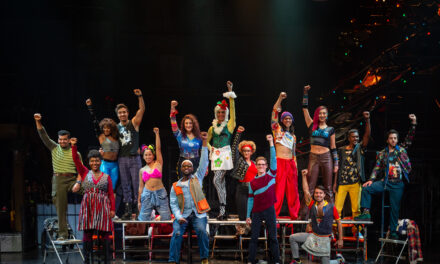Born and raised in Houston, Josh Inocéncio is a playwright and performer who focuses on queer and Indigenous reclamations within Latinx and Euro-American cultures. As a cultural worker, storyteller, and bridge-maker, Inocéncio’s purpose, in his words, “is to bridge my ancestries and nourish the memories. With each generation preserving fewer fragments, I perform to remember.”
This February, Inocéncio brings to Stages Repertory Theatre’s Sin Muros: A Latina/o Theatre Festival the world premiere production of Purple Eyes, the first in a trilogy that looks at his three cultures. Splintered in Three: An American Trilogy also includes The Little Edelweiss: Or, An Immigrant’s Fairytale, which focuses on his Austrian roots, and Chocolate Gravy And White Jesus, which focuses on his rural Kentucky Appalachian roots. In all three solo pieces, Inocéncio performs as himself and ancestral figures from his three backgrounds.
Purple Eyes explores the intersections of queerness and Chican@ identity alongside the legacy of machismo in four generations of Inocéncio men, from Michoacán, Mexico, to Montrose, Tejas. The Inocéncios have origins in Michoacán, a state in southern Mexico, and as Inocéncio’s cousin Chuy suggests in Purple Eyes, “those Michoacán men, tú sabes, are on another level of machismo.” Purple Eyes is what Inocéncio calls an “ancestral auto/biographical” performance piece which explores his upbringing as a closeted gay Chicano living in the midst of the cultural heritage of machismo in Houston.
Following a legacy of solo performance storytelling aesthetics seen in John Leguizamo’s Freak and Luis Alfaro’s Downtown, Josh Inocéncio’s Purple Eyes plays with memory to understand how the United States and Mexico have influenced his family and his own identity formation. In the piece, Josh invokes four generations of Inocéncio men, giving life to his great-grandpa Jesus planting strawberries in Michoacán, his grandpa José fighting in World War II, his dad Joel going undercover in drag at gay nightclubs in Montrose, to finally himself embracing his sexuality and where he fits into this legacy. Purple Eyes uses memories as platforms in which Josh reclaims moments in these four men’s lives when they have contested hyper-masculine environments.
In this interview, Inocéncio discusses the Sin Muros production of Purple Eyes, The Little Edelweiss, and the Houston theatre scene.
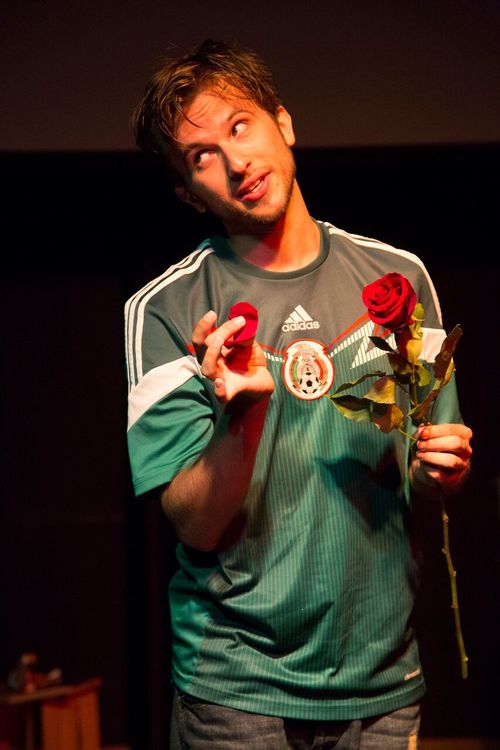
Josh Inocencio in Purple Eyes. Photo by ProyectoTeatro.
Trevor Boffone: After touring Purple Eyes since 2015, the play will finally receive its World Premiere at Sin Muros. How has Purple Eyes changed since the original workshop when you were a graduate student at Florida State University in 2015? What will be different about the Sin Muros production?
Josh Inocéncio: The workshop performance in Tallahassee—directed by my friend and colleague Jeff Paden—was a great test for certain script elements, especially the use of Spanish. Initially, I was afraid that non-Spanish speakers would have trouble with some of the humor in the play, but the talkback sessions put those anxieties to rest. As I’ve toured the play in Texas, I haven’t made huge textual shifts. Mostly just little sections I’ve cut or lines I’ve changed—but they add up. Not to mention, because this play deals with so much family history, I had to decide which identities to keep anonymous and which to name. That changed with every showing and as the play became more public across Texas. This performance at Stages, as far as the text, will resemble the performance I did at the University of Houston last year.
TB: What does it mean to you for Purple Eyes to have its World Premiere in Houston?
JI: It’s a tremendous honor. You know, I really hope to perform this play in New York City and Los Angeles someday (hopefully before I get too old for the role!), but it was important for me from the beginning to have the world premiere in Texas. Much of Purple Eyes takes place in Houston and even some in Montrose, so I wanted the city that made the play to get the world premiere. Too often we have to export the stories of our regions to coastal cities for recognition back home, so I’m happy and humbled that Purple Eyes is premiering here to a Houston audience.
TB: Can you tell us more about how Purple Eyes landed in Sin Muros?
JI: A colleague of mine suggested that Kenn McLaughlin include me on a panel for his directing class at Sam Houston State University. From there, Kenn and I hit it off and I shared Purple Eyes with him. Already inspired to lead a local initiative, Kenn said he wanted Purple Eyes to headline a Latina/o festival. That’s when we first formed the task force for Sin Muros. It’s been a very empowering experience to both plan the festival and be a part of it with my play. Hopefully, other theatres will take a cue from Stages and we can continue transforming Houston into a city where theatre artists can live and work long-term.
TB: Since returning to Houston in 2015 you’ve developed deep roots in the community. How have you grown as a theatre artist in the last few years while in Houston?
JI: Living in Houston has made me a more entrepreneurial artist. As playwrights, we constantly have to promote our work. When I moved back to Texas, I knew I wanted to do a tour but wasn’t quite sure how. I had a website with production photos from Florida, so I just started sending out emails to theatre companies and colleges. Eventually, a theatre in Austin brought me in summer 2016—and from there the tour really took off. I averaged a full-scale performance per semester with excerpt performances (a 20 sampling with only two props) peppered throughout at conferences. All the traveling from Austin to the Valley to small-town Seguin has made me a better performer. And now I’m seeing posters with my face and the Purple Eyes logo around Houston, and it’s a bit weird! But I can see the fruits of my labor through proactively reaching out to universities—it’s all culminated in this world premiere! And there have been so many generous theatre workers here in Houston who have helped me along the way. I wouldn’t be where I was without a team of advocates.
TB: What would you change about the Houston theatre scene?
JI: Exactly what Stages is doing with this festival. We must emphasize local. Theatres across the country already do a good job of bringing a taste of what’s going on in New York or Los Angeles to their cities, but we don’t feature enough local artists. And I think a state like Texas—with four large cities—should have more sustainable opportunities for playwrights. Right now, I work five freelance jobs to support my writing career. But Houston, I think, is poised to be another Chicago-like theatre city with an array of professional paths. And personally, I’d love to remain in Texas and live sustainably as a writer.
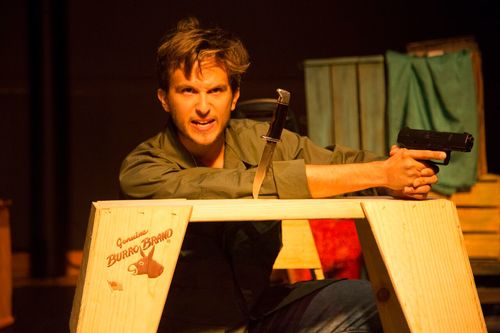
Josh Inocencio in Purple Eyes. Photo by ProyectoTeatro.
TB: The second chapter in your Splintered in Three Trilogy—The Little Edelweiss, or an Immigrant’s Fairytale—will premiere in March 2018. Can you tell us more about The Little Edelweiss?
JI: Yes, The Little Edelweiss will receive a staged reading, sponsored by Fresh Arts, here in Houston. As you mentioned, Purple Eyes is the first play in a trilogy called Splintered in Three that confronts collisions between ethnicity and sexuality in my three ethnic backgrounds. I’m Mexican, Austrian, and Appalachian. The project originated as a way for me to harmonize these three disparate backgrounds. So The Little Edelweiss—which has a cast of six actors—follows my bisexual Great-Uncle Manfred as he immigrates from war-torn Austria to the United States. He was a draft dodger, a movie star romancer, and a Hilton bartender. Last year, the play finished as a semifinalist at the Eugene O’Neill National Playwrights Conference and later this year it will also receive a reading at Teatro Milagro in Portland, OR. The final play in the trilogy, Chocolate Gravy & White Jesus, is still in the editing process.
TB: What should audiences expect from The Little Edelweiss?
JI: It’s going to be great fun! True to the fairytale form, the play captures my great-uncle and me in imagined scenarios (just snags I’ve taken from the legends and gossip about him), punctuated by a pantheon of ancestors as fairies, immigration officials as trolls, and FBI agents as giants. Three of the characters will be portrayed by puppets. Scenic designer Ariel Emmerson and props master Erin Kehr, who also worked on Purple Eyes, are in the throes of building those puppets now. The story itself is also much more sexually frank than Purple Eyes—which has more innocent depictions of sexuality—as it portrays queer men in pursuits of unapologetic pleasure. I’m eager to see how Houston audiences respond to the play’s content as well as its experimental form. So come on out in March to see it! And unlike Purple Eyes, this isn’t a solo play. The cast currently includes really talented Houston actors that I’m thrilled to work with, including Teresa Zimmermann, Alli Villines, Briana Resa, and Bryan Kaplun.
This post was written by the author in their personal capacity.The opinions expressed in this article are the author’s own and do not reflect the view of The Theatre Times, their staff or collaborators.
This post was written by Trevor Boffone.
The views expressed here belong to the author and do not necessarily reflect our views and opinions.

